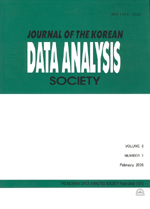부모의 외모관련 양육 태도와 사회문화적 태도가 아동의 신체존중감과 외모만족도에 미치는 영향
The Effects of Parenting Attitude and Socio-cultural Attitude toward Appearance on Children s Body Esteem and Their Appearance Satisfaction
- 한국자료분석학회
- Journal of The Korean Data Analysis Society (JKDAS)
- Vol.17 No.6
-
2015.123309 - 3319 (11 pages)
- 89

본 연구는 아동후기 아동들의 성별에 따라 아동이 지각한 부모의 외모관련 양육 태도, 아동의 외모에 대한 사회문화적 태도, 아동의 신체존중감, 외모만족도의 관계 특성을 살펴보았다. 결과에 따르면, 남자 아동의 경우, 신체존중감은 부모의 외모존중과 정적 관계를 보였으나, 부모의 외모관리 및 사회문화적 태도와는 부적 관계가 나타났다. 다음으로 외모만족도는 부모의 외모존중과 정적 관계를, 사회문화적 태도와는 부적 관계를 보였다. 여자 아동의 경우, 신체존중감은 부모의 외모존중과는 정적 관계를 보여주었으나, 부모의 외모관리, 부모의 외모규제, 사회적 문화적 태도와는 부적 관계를 보였다. 다음으로 외모만족도는 부모의 외모존중과는 정적 관계를, 부모의 외모관리, 부모의 외모규제제와는 부적 관계를 보였다. 결과들을 종합해보면, 부모들이 자녀의 외모에 대한 관심을 부정적으로 인식하여 규제하려 하거나 지나치게 자녀의 외모를 관리하기 보다는 자녀의 의견을 존중하고 그들이 자신의 개성을 찾도록 유도하는 방향으로 이끄는 것이 자녀의 신체존중감과 외모만족도를 고양시키는 데 도움이 됨을 시사한다.
The purpose of this study was to understand how parent s educational philosophy and socio-cultural attitude toward physical appearance can affect the way elementary school students develop their attitude toward physical appearance and provide information that is useful for parents to guide their children in managing their physical appearance. The results of this research are as follows. For male children, there was a relationship between body esteem and parents appearance respect, while body esteem and socio-cultural behavior concerning appearance were negatively correlated. For female children, body esteem was statically correlated to parents appearance respect, while parents appearance regulations and socio-cultural attitudes were negatively correlated. Concerning satisfaction with appearance, as well, there was a negative relationship with parents appearance respect and a negative relationship with parents appearance regulations. The result shows that parents educational philosophy and socio-cultural attitude toward physical appearance as perceived by their children have high correlation with children s self-respect for and level of satisfaction for their physical appearance. Accordingly, family, school and society must make concerted efforts on educating children about physical appearance in the right way so that culture that respects children s physical appearance and their individuality can be formed.
1. 서론
2. 연구 방법
3. 결과
4. 논의 및 결론
References
(0)
(0)